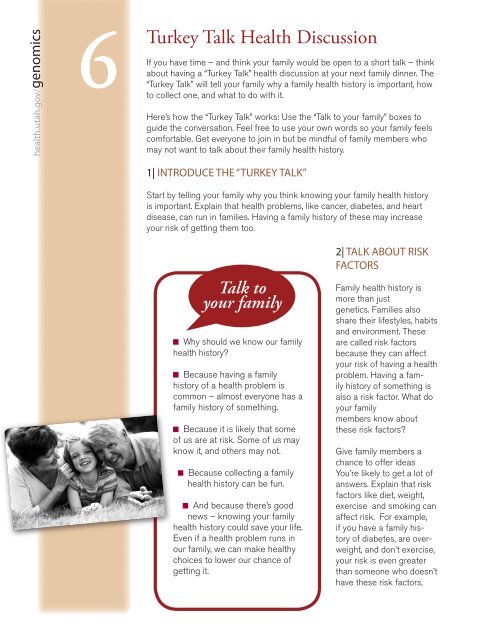Family Health History Toolkit - Utah Department of Health - Utah.gov
Family Health History Toolkit - Utah Department of Health - Utah.gov
Family Health History Toolkit - Utah Department of Health - Utah.gov
Create successful ePaper yourself
Turn your PDF publications into a flip-book with our unique Google optimized e-Paper software.
health.utah.<strong>gov</strong>/ genomics6Turkey Talk <strong>Health</strong> DiscussionIf you have time – and think your family would be open to a short talk – thinkabout having a “Turkey Talk” health discussion at your next family dinner. The“Turkey Talk” will tell your family why a family health history is important, howto collect one, and what to do with it.Here’s how the “Turkey Talk” works: Use the “Talk to your family” boxes toguide the conversation. Feel free to use your own words so your family feelscomfortable. Get everyone to join in but be mindful <strong>of</strong> family members whomay not want to talk about their family health history.1| INTRODUCE THE “TURKEY TALK”Start by telling your family why you think knowing your family health historyis important. Explain that health problems, like cancer, diabetes, and heartdisease, can run in families. Having a family history <strong>of</strong> these may increaseyour risk <strong>of</strong> getting them too.Talk toyour familyWhy should we know our familyhealth history?Because having a familyhistory <strong>of</strong> a health problem iscommon – almost everyone has afamily history <strong>of</strong> something.Because it is likely that some<strong>of</strong> us are at risk. Some <strong>of</strong> us mayknow it, and others may not.Because collecting a familyhealth history can be fun.And because there’s goodnews – knowing your familyhealth history could save your life.Even if a health problem runs inour family, we can make healthychoices to lower our chance <strong>of</strong>getting it.2| TALK ABOUT RISKFACTORS<strong>Family</strong> health history ismore than justgenetics. Families alsoshare their lifestyles, habitsand environment. Theseare called risk factorsbecause they can affectyour risk <strong>of</strong> having a healthproblem. Having a familyhistory <strong>of</strong> something isalso a risk factor. What doyour familymembers know aboutthese risk factors?Give family members achance to <strong>of</strong>fer ideasYou’re likely to get a lot <strong>of</strong>answers. Explain that riskfactors like diet, weight,exercise and smoking canaffect risk. For example,if you have a family history<strong>of</strong> diabetes, are overweight,and don’t exercise,your risk is even greaterthan someone who doesn’thave these risk factors.


